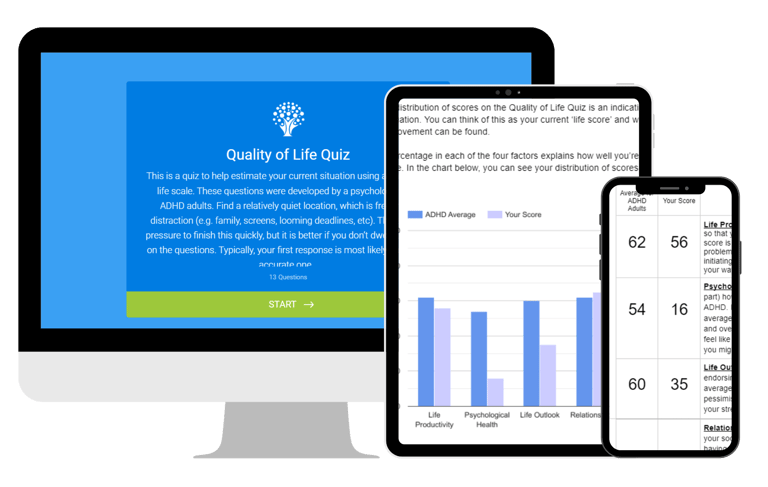ADHD in Adults:
A Complete Guide
Hey there! Welcome to this comprehensive guide on ADHD in adults.
Whether you're an individual seeking answers about ADHD or someone looking to understand this complex condition better, you've come to the right place. As a passionate ADHD coach with my psychologist partner (Dr. Claire Sira), we're excited to share knowledge with you and provide a complete overview of ADHD, covering everything from late-in-life diagnosis to treatment methods and the complexities often associated with this condition.
So, let's dive in and explore this fascinating world of ADHD!


Late In Life
Top 4 Treatments
Quality of Life
Complicated
Diagnosis
Self Regulation
Executive Function
Conclusion
Chapters
Late In Life Diagnosis
One of the most common challenges we hear is that ADHD symptoms are not identified in childhood and the adults are facing a late-in-life diagnosis of ADHD. Many individuals may have lived with undiagnosed ADHD throughout their childhood and adolescence, only realizing the true cause of their struggles later in life.
Late diagnosis can bring a mix of emotions, ranging from relief at finally understanding the underlying reasons for certain difficulties to frustration at past mistakes and grief over the lost opportunities for early intervention. However, it's essential to recognize that an ADHD diagnosis at any age is a valuable step toward improving one's quality of life.
If you suspect that you or someone you know may have ADHD, don't hesitate to seek professional guidance. A formal diagnosis can open doors to tailored treatments and support, helping you navigate the challenges associated with ADHD more effectively.


How to Track My Quality of Life
Understanding how ADHD impacts your quality of life is crucial for creating an effective treatment plan. Tracking your quality of life involves being aware of how ADHD symptoms affect various areas of your life, such as work, relationships, emotional well-being, and overall satisfaction.
One helpful tool for tracking your quality of life is taking the "Quality of Life Quiz for Adults with ADHD." This research-based quiz offers valuable insights into your unique experiences and struggles related to ADHD. By taking this quiz, you can gain a better understanding of areas that might benefit from intervention and support.
Additionally, keeping a journal or using apps to track your daily experiences can provide valuable information. Note your mood, productivity, and challenges you faced throughout the day. This journal can help identify patterns and triggers, providing valuable insights for your treatment journey.
Top 4 Methods for Treating ADHD
Treating ADHD in adults is a multi-faceted process that involves a combination of approaches. Here are the top four methods that have proven effective in managing ADHD symptoms:


2/ Learning Skills to Manage ADHD Traits
Skill-building techniques empower individuals with ADHD to actively manage their symptoms effectively. These skills may include time management strategies, organizational tools, and coping mechanisms for emotional challenges.
3/ Coaching
ADHD coaching provides personalized support and strategies to address specific challenges and capitalize on the adults’ strengths. ADHD coaches work with individuals to set and achieve goals, navigate daily obstacles, grow their confidence through practice and build resilience to stress.
4/ Stimulant Medication
For some individuals, stimulant medication, such as methylphenidate or amphetamines, can be effective in managing ADHD symptoms. Medication can help improve focus, attention, and impulse control, leading to better overall functioning.
1/ Cognitive Behavioral Therapy (CBT)
CBT is a goal-oriented therapy that helps individuals identify and change negative thought patterns and behaviors. It's particularly beneficial for addressing procrastination, overwhelm, self limiting beliefs, emotional regulation, and self-esteem challenges in individuals with ADHD. The research indicates that combining CBT with ADHD medication is more effective than taking medication alone.
Why ADHD Is So Complicated
ADHD is a complex condition that often intertwines with other mental health challenges. Individuals with ADHD may also experience anxiety, depression, and have a history of trauma. The coexistence of these conditions can make the management of ADHD even more challenging.
For example, anxiety may exacerbate difficulties with focus and decision-making (as will cellphones and apps), while depression can impact motivation and energy levels. Moreover, individuals who have experienced trauma may face additional emotional hurdles.
It's crucial to address these coexisting conditions alongside ADHD. A holistic treatment approach that takes into account all aspects of an individual's mental health can lead to more effective and lasting improvements.


Do I Need A Formal Diagnosis?
If you suspect that you or a loved one has ADHD, seeking a formal diagnosis is an important step. While self-assessment quizzes and personal observations can provide valuable insights, a formal diagnosis from a qualified healthcare professional is crucial for several reasons:


Tailored Treatment
A formal diagnosis allows for personalized treatment plans that cater to an individual’s specific needs and challenges.
Access to Support Services
Can open doors to support services, such as accommodations at work or in educational settings, that can improve daily functioning to achieve your goals.
Validation and Understanding
Can provide a sense of validation and understanding, helping you make sense of past struggles and experiences.
Early Intervention
A timely diagnosis can lead to early intervention and support, which can significantly improve long-term outcomes and quality of life.
Self Regulation Coaching for ADHD
Self-regulation is a vital skill for individuals with ADHD. It involves recognizing emotions, impulses, and reactions, and learning how to respond in a controlled and intentional manner. For those with ADHD, emotional dysregulation can be particularly challenging, leading to difficulties in relationships, decision-making, and reduced well-being.
That's where self-regulation coaching comes in. A self-regulation coach works with individuals to identify emotional triggers, understand their impact, and implement strategies to manage and channel emotions more effectively.
During coaching sessions, adults explore mindfulness practices, breathing exercises, and cognitive restructuring techniques to help gain better control over dysregulated emotions. By enhancing one’s emotional intelligence, adults with ADHD can reduce stress, increase focus, and improve interactions with others.
Self-regulation coaching is not about suppressing emotions but rather understanding and managing them in a healthy way. With the guidance of a skilled coach, individuals with ADHD can develop emotional resilience and learn to navigate life's ups and downs with grace and self-awareness.



Executive Function Coaching for ADHD
Another powerful tool for managing ADHD is Executive Function Coaching. As an experienced ADHD coach, I have witnessed incredible transformations in individuals who have received this type of coaching.
Executive function refers to a set of cognitive processes that are responsible for tasks like planning, organizing, time management, and working memory. These processes can be challenging for individuals with ADHD, leading to difficulties in daily functioning.
Executive Function Coaching is designed to address these specific challenges. Coaches work with clients to identify areas of specific executive function deficits (like impulsive behaviours that get in the way of their long term goals) and collaboratively develop strategies to improve these skills.


For instance, if time management is a struggle, your coach might help you break tasks into smaller steps, create a realistic schedule, and set reminders to stay on track. If organizing is an issue, they might suggest using tools and systems developed specifically for adults with ADHD to keep things in order.
The beauty of Executive Function Coaching lies in its personalized approach. Each coaching session is tailored to address the adult’s unique needs and strengths, making it highly effective in improving daily functioning and overall quality of life.
Conclusion
In conclusion, ADHD in adults is a complex and varied condition that can negatively impact many aspects of life. The correct diagnosis (of ADHD and anything else that might accompany ADHD), tracking quality of life, and choosing effective treatment methods are essential steps in managing ADHD and improving overall well-being.
By recognizing the complexities often associated with ADHD, such as coexisting conditions like anxiety and depression, individuals can seek a holistic approach to treatment. Don't hesitate to seek a formal diagnosis from a qualified healthcare professional to access tailored treatments and support services. ADHD is a lifelong condition, so it’s never too late to get an assessment for ADHD.
Remember, you are not alone on this journey. Reach out to support groups and professionals who understand the challenges ADHD brings to everyday life challenges. These people are dedicated to empowering individuals with ADHD to thrive.
Embrace your uniqueness, explore treatment options, and take charge of your ADHD journey with confidence. Together, we can create a world where individuals with ADHD are empowered, understood, and celebrated for their unique strengths.


Late In Life
Top 4 Treatments
Quality of Life
Complicated
Diagnosis
Self Regulation
Executive Function
Conclusion
Chapters
Who are Dr. Claire Sira and Tom Hudock?
Over the past 10 years, Dr. Claire and Tom have coached individuals and groups for ADHD, authored books, and created software called HyperFocus that helps doctors effectively assess ADHD. We equip adults with the skills and awareness for taking on ADHD challenges.
132-328 Wale Rd,
Colwood, BC V9B 0J8
(c) 2025 ADHD For Life Productions Inc.
Privacy Policy | Terms and Conditions
Connect with Dr. Claire Sira and Tom Hudock on Social Media:




